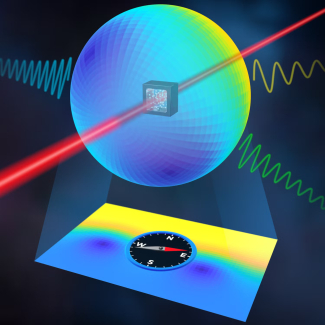Researchers at the University of Colorado Boulder have developed a novel method to measure magnetic field orientations using atoms as minuscule compasses. The research, a collaboration between JILA Fellow and CU Boulder physics professor Cindy Regal and Svenja Knappe, a research professor in the Paul M. Rady Department of Mechanical Engineering, was recently published as the cover article in the journal Optica.
This advancement could pave the way for new quantum sensors applicable in brain activity mapping and global navigation systems. The technique involves exposing a vapor of rubidium atoms to a magnetic field and using lasers to detect energy shifts, effectively turning each atom into a precise compass needle. This approach offers a more stable and accurate alternative to traditional mechanical sensors, which can degrade over time.
Read the full CU Boulder Today article at this link.



 The Physics Frontiers Centers (PFC) program supports university-based centers and institutes where the collective efforts of a larger group of individuals can enable transformational advances in the most promising research areas. The program is designed to foster major breakthroughs at the intellectual frontiers of physics by providing needed resources such as combinations of talents, skills, disciplines, and/or specialized infrastructure, not usually available to individual investigators or small groups, in an environment in which the collective efforts of the larger group can be shown to be seminal to promoting significant progress in the science and the education of students. PFCs also include creative, substantive activities aimed at enhancing education, broadening participation of traditionally underrepresented groups, and outreach to the scientific community and general public.
The Physics Frontiers Centers (PFC) program supports university-based centers and institutes where the collective efforts of a larger group of individuals can enable transformational advances in the most promising research areas. The program is designed to foster major breakthroughs at the intellectual frontiers of physics by providing needed resources such as combinations of talents, skills, disciplines, and/or specialized infrastructure, not usually available to individual investigators or small groups, in an environment in which the collective efforts of the larger group can be shown to be seminal to promoting significant progress in the science and the education of students. PFCs also include creative, substantive activities aimed at enhancing education, broadening participation of traditionally underrepresented groups, and outreach to the scientific community and general public.